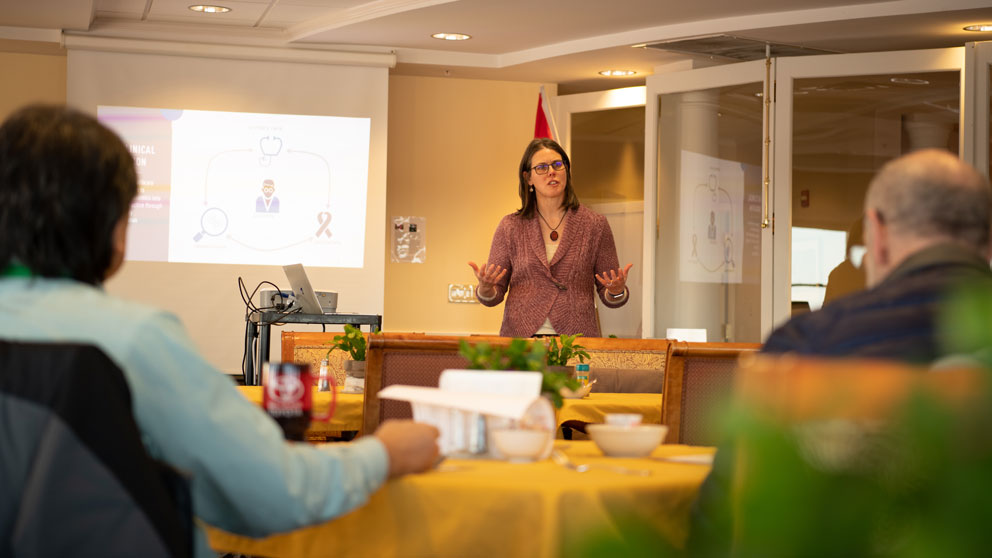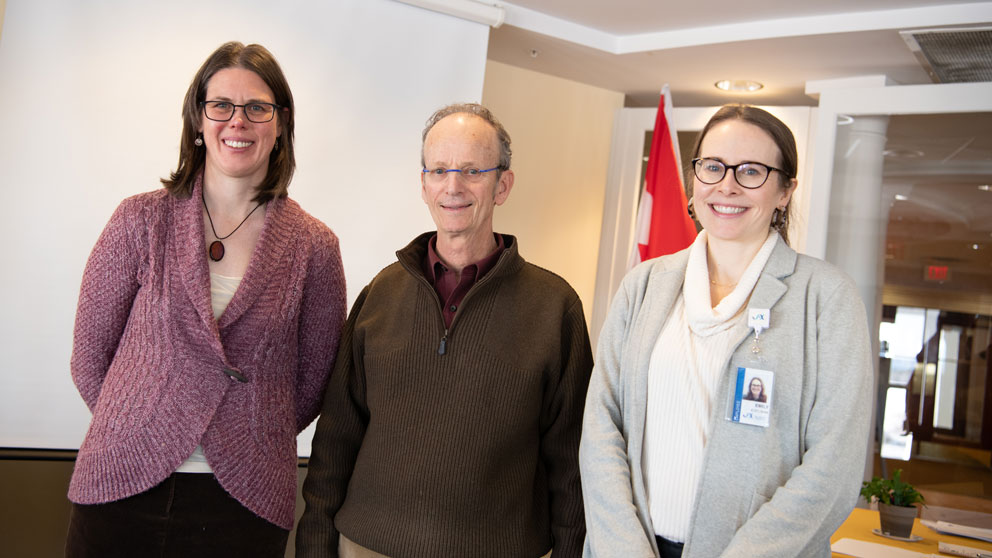
Kate Reed, director of continuing education at The Jackson Laboratory, presents on how physicians can more effectively use genetics to identify patients who have an increased cancer risk. In the audience were caregivers, doctors and nurses from Mount Desert Island Hospital. JAX photo by TIffany Laufer."
This is Abbi. She’s 34 years old, married with one son. Her sister has endometrial cancer, her uncle and cousin have colon cancer, and her aunt has been diagnosed with gastric cancer. What is Abbi’s cancer risk?
Abbi’s case is under review by about a dozen doctors, nurses, physician’s assistants and nurse-practitioners from Mount Desert Island (MDI) Hospital in Bar Harbor, Maine, but Abbi is a fictional character and they’re not in a hospital room. The group is gathered for grand rounds (the medical community’s term for educational lectures) in a comfortable dining room at Birch Bay Village, a hilltop retirement community owned by the hospital.
A sparkling panorama of ocean and snow-covered hills fills the wraparound windows of the dining room where the MDI staff are taking notes. This morning’s program, “Practical Cancer Genetics: How to identify patients at increased risk,” is presented by the department of The Jackson Laboratory, the headquarters campus of which is less than two miles from MDI Hospital.
“When I talk to clinicians I usually I have to explain what JAX is,” Kate Reed, JAX director of continuing education, tells the group. “That it’s a nonprofit biomedical research institution, and that it has a National Cancer Institute-designated The JAX Cancer CenterThe Jackson Laboratory Cancer Center (JAXCC) is a National Cancer Institute-designated Cancer Center complemented by institutional education, resource and service initiatives that support cancer research world-wide. The JAXCC comprises approximately 50 members with multidisciplinary expertise who are united in research aimed at understanding and targeting the genomic complexity of cancer.Cancer Center . But you already know that because you’re right around the corner from us!”
Reed is standing by a screen projecting an image of Abbi’s fictional family tree. “Using the app on your phone,” she directs, “please vote for how high you think Abbi’s cancer risk is.” The results of the poll show up instantly on the screen; “high risk” gets the most votes but a few participants have chosen “average risk.”
Reed leads the group in a lively conversation about the case. A nurse points out that Abbi’s relatives with cancer had all been diagnosed in their 40s and 50s, early onset that suggests an inherited component. A doctor comments that the cancers in the family correspond to Lynch syndrome, a type of inherited cancer syndrome associated with a higher risk of certain types of cancer (including colorectal, gastric and endometrial cancers).
Cancer and inheritance
Cancer has been described as the ultimate genetic disease, because all cancers involve some kind of alteration in DNA. A cancerous mutation could cause suppression or hijacking of the patient’s immune system, turning off normal cell death, or many other mechanisms leading to uncontrolled tumor growth.
Many of these cancerous mutations occur spontaneously, likely triggered by exposure to environmental factors such as smoking or excessive radiation. The lifelong accumulation of mutations is why aging is the greatest risk factor for cancer.
Other cancer-related mutations are inherited. For example, a small minority of people inherit mutations that are very likely to lead to cancer. Individuals with mutations in Curing breast cancer: When, how, and what’s next?A diagnosis of breast cancer is always devastating, but advances in research are pushing incidence and mortality trends in the right direction — down.BRCA1 and BRCA2 are identified as having hereditary breast and ovarian cancer syndrome (HBOC) and are at significantly increased risk for developing early-onset breast and ovarian cancer, as well as some other cancer types.
Most of us are somewhere in between, carrying combinations of inherited genetic variants that, interacting with environmental factors, either exacerbate cancer risk to some degree or provide some resilience against the disease. That’s why a detailed family history — ideally including aunts, uncles, cousins and grandparents as well as parents, children and siblings — can give medical providers a powerful tool for determining which patients would benefit most from cancer screening and, potentially, genetic testing.

From left are Reed, Dr. Julian Kuffler from MDI Hospital, and Emily Edelman, associate director, continuing education at JAX. Photo by Tiffany Laufer.
Tools for medical practitioners
Advances in genomic research and technologies, such as whole-genome sequencing, hold the promise of a new era of precision medicine, in which diagnosis, treatment and even prevention are based on each individual’s unique genetic makeup.
“Genomics is significant to the continuum of cancer care from identifying individuals at high risk based on family history to testing tumors to target treatment,” Reed says. “Testing for inherited genetic risk can identify individuals at high risk who would benefit from increased screening. Primary care providers are on the front line to identify these individuals who would benefit from genetic testing or referral to a genetics professional.”
Reed also notes that medical expert advisory groups such as the National Comprehensive Cancer Network and the American Cancer Society are issuing evidence-based guidelines that recommend increased screening regimens for individuals at increased and high cancer risk based on personal history, family history and genomic data.
However, there’s a gap between genomic discoveries and implementing the new knowledge into everyday medical practice. Physicians admit to this knowledge gap; in a recent survey, most rated their knowledge of genetics and guidelines for genetic testing as somewhat or very poor.
“To leverage the benefits of genetic testing,” Reed says, “physicians must have knowledge and skills to provide such services appropriately.”
In the past six years, JAX has stepped in to build education and training programs for healthcare professionals to integrate genetics and genomics into their clinical practice. The Clinical and Continuing Education team develops a variety of and resources as well as in-person interactive workshops. Many, including this morning’s grand rounds, offer continuing medical and nursing education units (CME and CNE), which are awarded for successful completion.
“Practical Cancer Genetics” was specifically designed to help clinicians incorporate their patients’ family history into their medical assessments. The doctors and nurses learn how to collect sufficient family history information to assess for cancer risk, analyze the family history to identify patients at increased or high risk of cancer, and refer appropriate patients to local genetic services. “The ultimate goal,” Reed says, “is to diagnose and treat cancer early for the best possible patient outcomes.”
Reed and her colleagues Emily Edelman and Linda Steinmark, the latter of whom is based at The Jackson Laboratory for Genomic Medicine in Farmington, Conn., have presented similar presentations at meetings of many New England health systems and professional organizations, including the Society of Urological Nurses, the Connecticut Cancer Registrars, and Planned Parenthood of New England.
“We want to help clinicians integrate genetics into their practice,” Reed says, “which is why we focus on the applications, such as cancer genetics, that have proven clinical utility. We develop all of our programs, including these presentations, using best adult education practices, to help providers gain skills and confidence using those skills. That’s one reason this presentation included two cases, polling, and discussion: We want them to think about the content and have practice applying it by making decisions.”
As they take a last sip of coffee and gather their coats and gloves for the chilly walk to their cars, the MDI Hospital participants express enthusiasm about their morning of grand rounds.
A nurse notes, “I obtained a greater understanding of genomic testing and the benefits it has for patients.”
“Knowledge always enhances competency,” a physician comments. “Programs like this help us keep up with what’s coming and what’s new. Genetic components are getting a lot more involved in every aspect of medicine.”